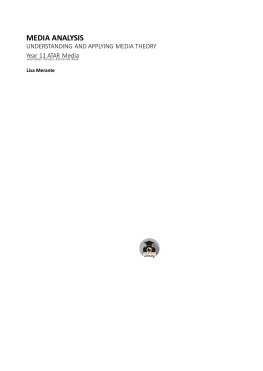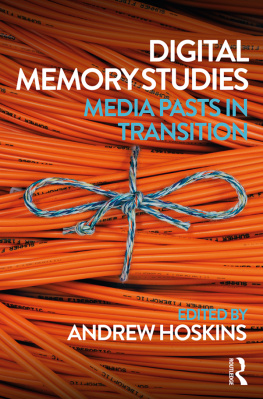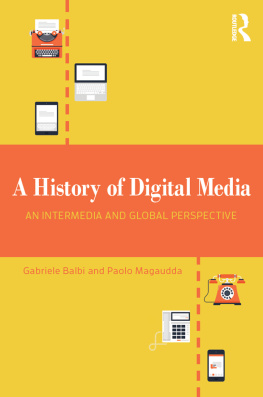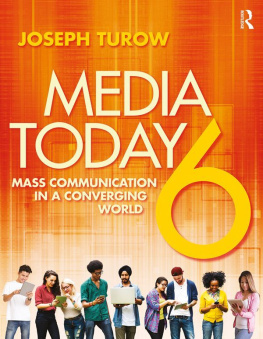
Media Studies 2.0
Media Studies 2.0 offers an exploration of the digital revolution and its consequences for media and communication studies, arguing that the new era requires an upgraded discipline: a media studies 2.0.
The book traces the history of mass media and computing, exploring their merger at the end of the 20th century and the material, ecological, cultural and personal elements of this digital transformation. It considers the history of media and communication studies, arguing that the academic discipline was a product of the analogue, broadcast era, emerging in the early 20th century as a response to the success of newspapers, radio and cinema and reflecting that era back in its organisation, themes and concepts.
Digitalisation, however, takes us beyond this analogue era (media studies 1.0) into a new, post-broadcast era. Merrin argues that the digital era demands an upgraded academic discipline: one reflecting the real media life of its students and teaching the key skills needed by the 21st-century user. Media 2.0 demand a media studies 2.0
This original and critical overview of contemporary developments within media studies is ideal for general students of media and communication, as well as those specifically studying new and digital media.
William Merrin is an Associate Professor in Media Studies at Swansea University, with research interests in media theory, digital media and culture and media history. He is the author of Baudrillard and the Media (2005) and co-editor of Jean Baudrillard: Fatal Theories (Routledge, 2008).
Media Studies 2.0
William Merrin
First published 2014
by Routledge
2 Park Square, Milton Park, Abingdon, Oxon OX14 4RN
and by Routledge
711 Third Avenue, New York, NY 10017
Routledge is an imprint of the Taylor & Francis Group, an informa business
2014 William Merrin
The right of William Merrin to be identified as author of this work has been asserted in accordance with sections 77 and 78 of the Copyright, Designs and Patents Act 1988.
All rights reserved. No part of this book may be reprinted or reproduced or utilised in any form or by any electronic, mechanical, or other means, now known or hereafter invented, including photocopying and recording, or in any information storage or retrieval system, without permission in writing from the publishers.
Trademark notice: Product or corporate names may be trademarks or registered trademarks, and are used only for identification and explanation without intent to infringe.
British Library Cataloguing in Publication Data
A catalogue record for this book is available from the British Library
Library of Congress Cataloging in Publication Data
Merrin, William.
Media studies 2.0 / William Merrin.
pages cm
Includes bibliographical references and index.
1. Mass media. 2. Digital media. I. Title.
P90.M455 2014
302.23dc23
2013040863
ISBN: 978-0-415-63862-3 (hbk)
ISBN: 978-0-415-63863-0 (pbk)
ISBN: 978-0-203-08358-1 (ebk)
Typeset in Sabon
by Taylor & Francis Books
Contents
Introduction
Media studies gone wrong
This book begins with an apology to my then 10-year-old son, Henry, for my complete hypocrisy. Moments after I sat down to write this introduction I was disturbed by him asking if he could have a YouTube channel. All his friends had them, he said, and he only wanted it to message them. I immediately explained why this wasnt going to happen. After half an hour of tantrums (mine as well as his) and several uninspired attempts to find a way to open the book I gave up and said Id look into it: wed see if it was legal and if it could be set up with the appropriate controls. It was then that I discovered there was already a YouTube account registered with the email address I used for him. I asked if he already had an account and he denied it, several times, before admitting that, yes, actually, he did have one and hed just forgotten about it. I asked if that was really true and he said it was, several times, before admitting that he hadnt forgotten it, only the password, hence he wanted a new account. After further grilling I discovered that a couple of nights before, during a sleepover, he and a friend had got bored of watching videos, had decided to create their own channels and had spent the evening accruing a number of friends and followers and favouriting a variety of inappropriate videos. More importantly hed also created and posted his first video.
I hadnt thought that was possible: he didnt have a camera and I didnt think hed know how to post anything to the site. In fact he and his friend had simply Googled How do you make a YouTube video? and discovered a video-creation app that allowed them to create animations and the soundtrack for them. For reasons that remain unclear, theyd created a video entitled Love Gone Wrong, comprising an argument between a fizzy drink and a hamburger. When I first watched it I was confused as I thought it was in Spanish but when I listened closely I realised the content was explicit, mostly involving the drink and burger telling each other where to go and what they could do. The reason it was difficult to follow was because the dialogue had to be typed in and, thanks to the deficiencies of their local primary school and its helpful policy of not correcting errors in case it upsets the children, their spelling was frankly appalling. Then theyd posted it to a global audience.
The difference between my media world and my sons is a difference of kind, not degree. Compare that to my relationship to my parents childhood experiences. The only real difference between the world I grew up within and my parents was two more TV channels and commercial radio, whilst my better-off friends had colour TV and, by the early 1980s, VCRs too. This was a world of separate and limited forms: the telephone, that you didnt own, was screwed to the wall as a family resource and couldnt take photographs or videos; you couldnt get radio on the television; films didnt have special features, commentaries or alternative endings; and no one tried to break into your television to steal your money or identity. It was also a world of scarcity. Information was hard to come by, with its acquisition often being physically laborious, involving trips to shops or libraries.
Most importantly this was a world of powerlessness. As a consumer one had little control: you followed the schedules of the broadcasters or producers, with favourite shows available once a week and anything you missed was as good as gone forever. As a producer the situation was even worse. I as a 10-year-old, like most of the population, had little or no capacity to produce and share information. Our only means of feedback were tightly controlled and very little slipped through the media gatekeepers. Hence my delight one morning in 1984 watching the childrens show Saturday Superstore when during a live, audience phone-in to a pop band one caller managed to shout down the phone, Matt Bianco? Youre a bunch of wankers. This was an oasis of real participation in a world that prevented it. But even if wed been able to produce our own output there was little interest in non-professional production. Had I written down my thoughts in the morning and presented these updates to my school friends before assembly theyd have laughed at me. We expected information and entertainment to come from particular, official, high-quality, culturally acceptable sources.









